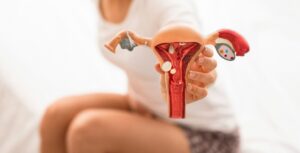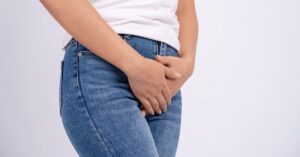
PCOS: Diagnosis, Research & Management
Polycystic Ovary Syndrome is a common endocrine disorder that affects people with ovaries, typically during their reproductive years.
Gynaecology > Pelvic Pain

Find Out More


We know that chronic pelvic pain can be deeply challenging and disruptive to your life. Our compassionate team of specialists is dedicated to offering you comprehensive, personalised care that addresses your unique needs.
Whether your pain is new or has been with you for a long time, we are here to support you in finding relief and enhancing your overall well-being.

Pelvic pain is discomfort that occurs in the lower abdomen, pelvic region, or perineum. This pain can be acute or chronic and may range from mild to severe.
It predominantly affects women and may be associated with a variety of conditions such as gynaecological disorders, including endometriosis, ovarian cysts, uterine fibroids, pelvic inflammatory disease, and adenomyosis.
Pelvic pain can also be linked to urological issues such as interstitial cystitis, urinary tract infections (UTIs), and prostatitis.
Acute pelvic pain in women can arise from various sources. Gynaecological causes include ovarian cysts, ectopic pregnancies, pelvic inflammatory disease (PID), endometriosis, fibroids, and menstrual pain.
Gastrointestinal issues such as appendicitis, diverticulitis, irritable bowel syndrome (IBS), and gastroenteritis can also lead to pelvic pain. Urinary problems like urinary tract infections (UTIs) and kidney stones are common culprits, as are musculoskeletal issues like muscle strains and pelvic floor dysfunction.
Other causes include sexually transmitted infections (STIs), hernias, and nerve-related pain such as pudendal neuralgia. Given the range of potential causes, seeking medical evaluation is essential to diagnose and treat the underlying issue appropriately.


Pelvic pain typically presents as a dull, aching pain ranging from mild discomfort to severe agony. Sharp or stabbing pains may occur suddenly with conditions like ovarian cysts or appendicitis. Women may experience pain during menstruation (dysmenorrhoea) or discomfort during or after sexual intercourse (dyspareunia).
Painful urination or bowel movements can also indicate pelvic issues. Chronic pelvic pain persists over extended periods, sometimes worsening with specific activities such as prolonged standing or physical exertion.
Additionally, women might feel pressure or heaviness in the pelvic region, accompanied by abdominal bloating or swelling. Changes in menstrual cycles, irregular periods, or pain localised to one side of the pelvis are also potential symptoms.
There are various pain management strategies available to help alleviate discomfort associated with pelvic pain, including:
Use our online booking engine or book your test by giving us a call.
On the online booking engine select the “appointment type” you need.
You will be seen by one of our friendly doctors or trained clinicians.

A pelvic pain screening or test typically involves a series of steps designed to diagnose the underlying cause of pelvic pain. Your healthcare provider will start by asking you detailed questions about your symptoms, medical history, and any other relevant information. This helps them understand the context of your pelvic pain.

A physical examination of the pelvic area will likely be performed. This may include palpation (gentle pressing) of the abdomen and pelvic organs to check for any abnormalities, tenderness, or swelling. Depending on your symptoms and suspected conditions, your doctor may request various laboratory tests such as urine tests, blood tests, or tests for sexually transmitted infections (STIs). In some cases, imaging studies may be necessary to visualise the pelvic organs and detect any structural abnormalities. This could include ultrasound, CT scans, or MRI scans.

Once the tests are completed and the results are in, your doctor will discuss the findings with you. They will explain any diagnoses made, the potential causes of your pelvic pain, and discuss treatment options.
Incorporated
in 1998
Experienced doctors & a professional team
Registration
not needed
Up-to-date with the latest treatments & testing
Strictly
confidential
Experienced doctors & a professional team
Affordable private
health care
Transparent fee structure with no hidden charges
We work with experienced consultants & healthcare professionals who have received positive feedback from our patients, and with whom we have established long-term relationships.
Latest Episode
Tune in to our podcast to explore the world of healthcare and learn from distinguished special guests. We cover everything from preventative measures to cutting-edge treatments so that you can stay informed and up-to-date on health-related things.

Polycystic Ovary Syndrome is a common endocrine disorder that affects people with ovaries, typically during their reproductive years.

Menopause is a natural biological process that marks the end of a woman’s reproductive years, typically occurring between ages 45

Learn about vaginal discharge: its role, what’s normal, and when to be concerned. Stay informed for optimal health.
Subscribe for latest updates & news


From same-day private GP and blood test appointments to visa medicals, a sexual and reproductive health clinic, and preventative health screenings, we are here to help.
Contact Us
Accepted Insurance Companies






Please note that Walk-in Clinic is a private medical centre & not an NHS service. Harley Walk-in Clinic Ltd company registration no. 07472804